CES 2023 is a very, very good year for PC monitors. Both OLED and Mini-LED—the displays of the future—are just on the cusp of mainstream adoption and, as a result, every monitor maker has launched a salvo of both mid-range and premium options that use these new display technologies. In fact, I’d argue the monitor space is now even more exciting than televisions.
From super-ultrawide form factors to folding panels, the monitors of CES 2023 are a wild bunch. Here are the 10 most eye-catching displays we encountered.
Further reading: Powerful laptops are large and in charge at CES 2023
LG Ultragear 27GR95QE-B
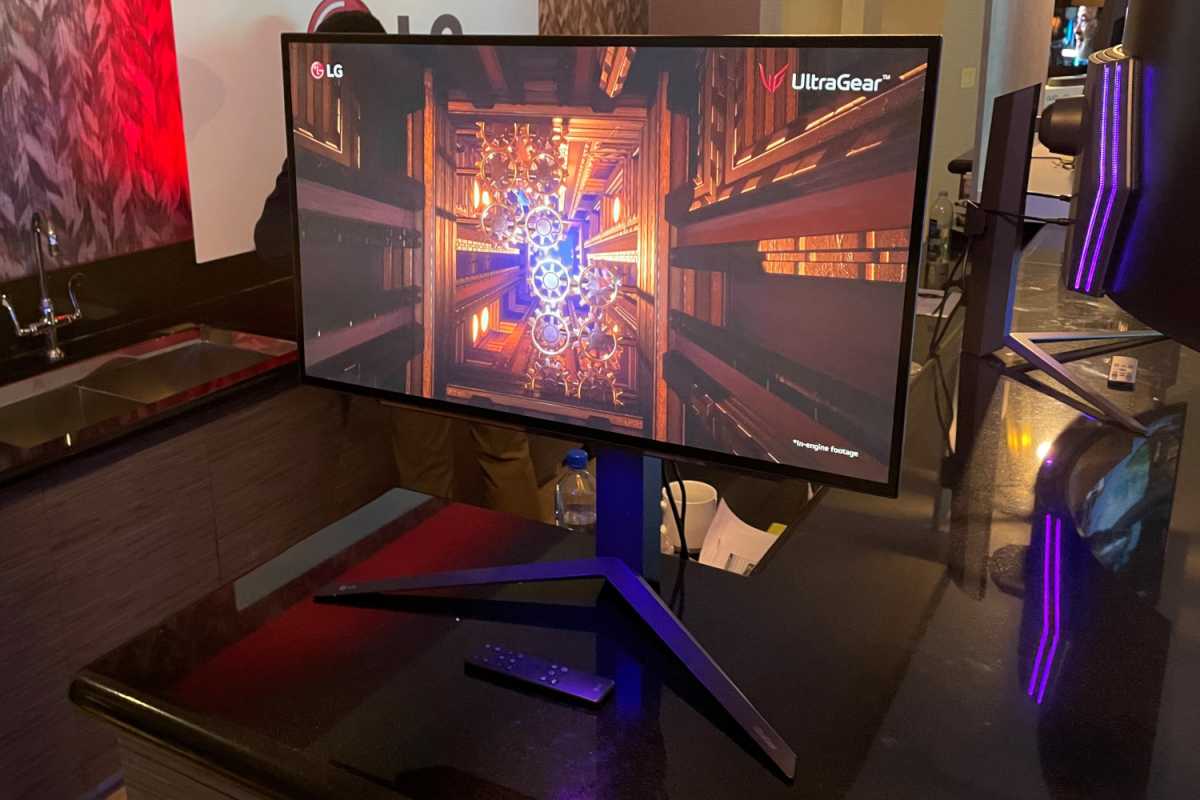
Matt Smith/IDG
The LG Ultragear 27GR95QE-B was technically released prior to CES 2023, yet it’s clearly the most important monitor at the show. Why? Because it’s the debut monitor for LG’s new 27-inch, 1440p, 240Hz OLED panel.
This panel, also found in several other monitors on this list, will have incredibly wide appeal. 1440p resolution is high enough to look sharp, yet won’t melt your GPU the moment you dare to launch Cyberpunk 2077. The panel’s refresh rate is ideal for gaming and feels ultra-responsive on the windows desktop.
But the most important spec? The price. At $999.99, the LG Ultragear 27GR95QE-B isn’t exactly affordable…but it’s much closer than OLED monitors of the past. This is an OLED monitor you can buy without feeling ashamed to admit how much you spent on it. Probably.
Acer Predator X27U
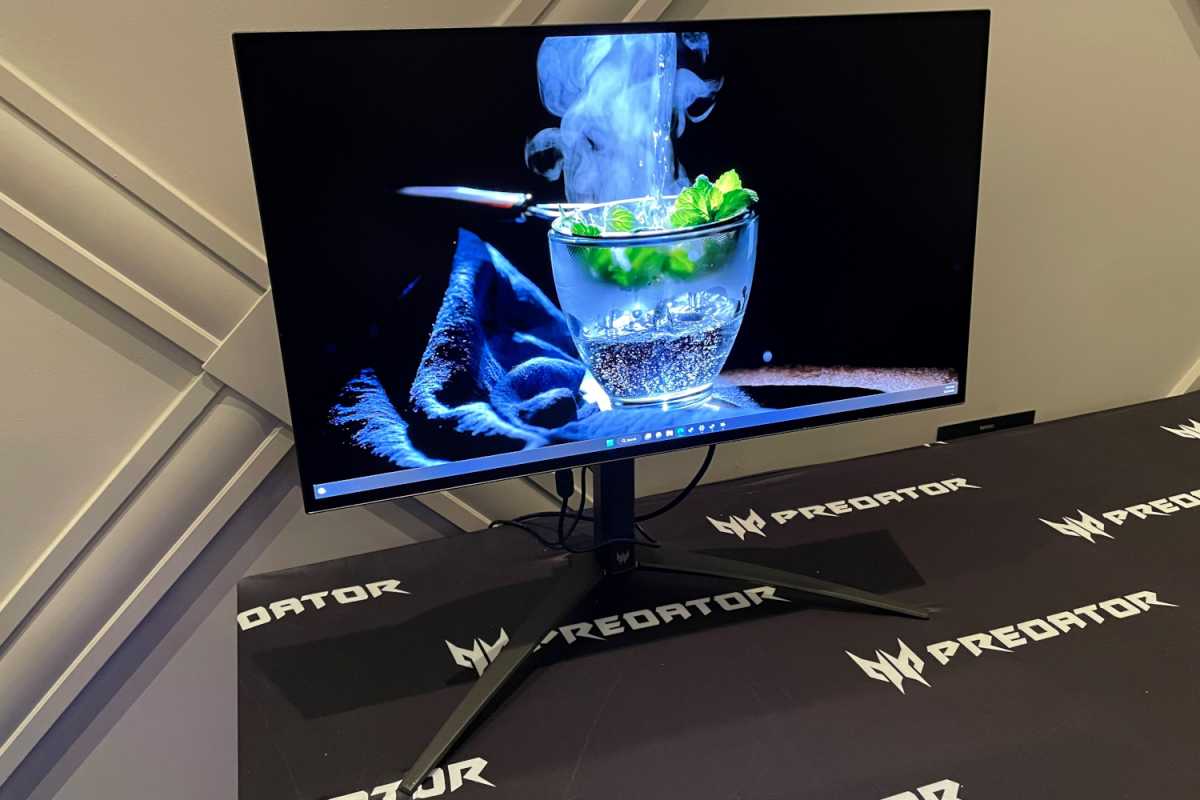
Matt Smith/IDG
Acer’s entry into the mainstream OLED arena is the Predator X27U. It’s a 27-inch, 1440, 240Hz OLED monitor that uses the same panel found in the LG Ultragear 27GR95QE-B and, as a result, looks equally gorgeous. The Predator X27U also quotes a maximum peak brightness of 1000 nits and a color gamut covering 98.5 percent of the DCI-P3 color gamut.
This monitor even delivers a feature far too rare among gaming displays: USB-C. It has one USB-C port with DisplayPort Alternate Mode and up to 90 watts of Power Delivery. This adds versatility and is particularly important for content creators and professionals considering the Predator X27U as a budget alternative to pricey “pro” OLED monitors.
The Acer Predator X27U will hit retailers in Q2 of 2023 at $1,099.99.
Asus ROG Swift PG27AQDM
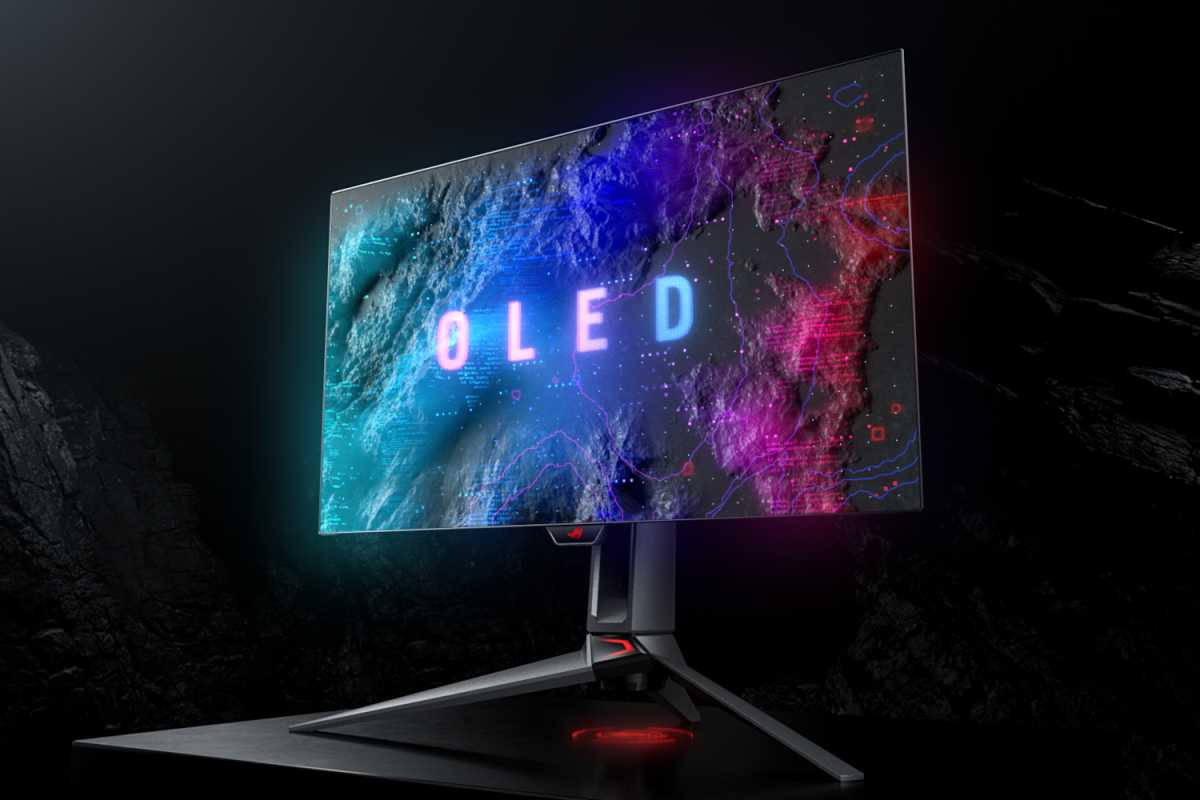
Asus
Asus’ is often among the quickest to jump on new monitor technology, and CES 2023 is no exception. The ROG Swift PG27AQDM is one of several monitors to pack LG’s hot new 27-inch, 1440p OLED panel. It promises incredible contrast, a peak brightness of 1000 nits, and a color gamut that spans 99 precent of DCI-P3. There’s also support for enhanced refresh rates of up to 240Hz.
But it’s the design, not the display panel, that sets the ROG Swift PG27AQDM apart from competitors. Its aggressive styling and top-notch build quality promises a premium experience worthy of the monitor’s premium price. Asus also makes vague claims that its “custom heatsink” will offer superior thermal performance. I’ll be eager to see if that translates to an improvement in image quality.
Speaking of which—Asus hasn’t revealed a price tag for the PG27AQDM yet. Given that LG’s OLED monitor retails at $999.99, however, it’s likely to land above $1,000.
Asus ROG Swift Pro PG248QP
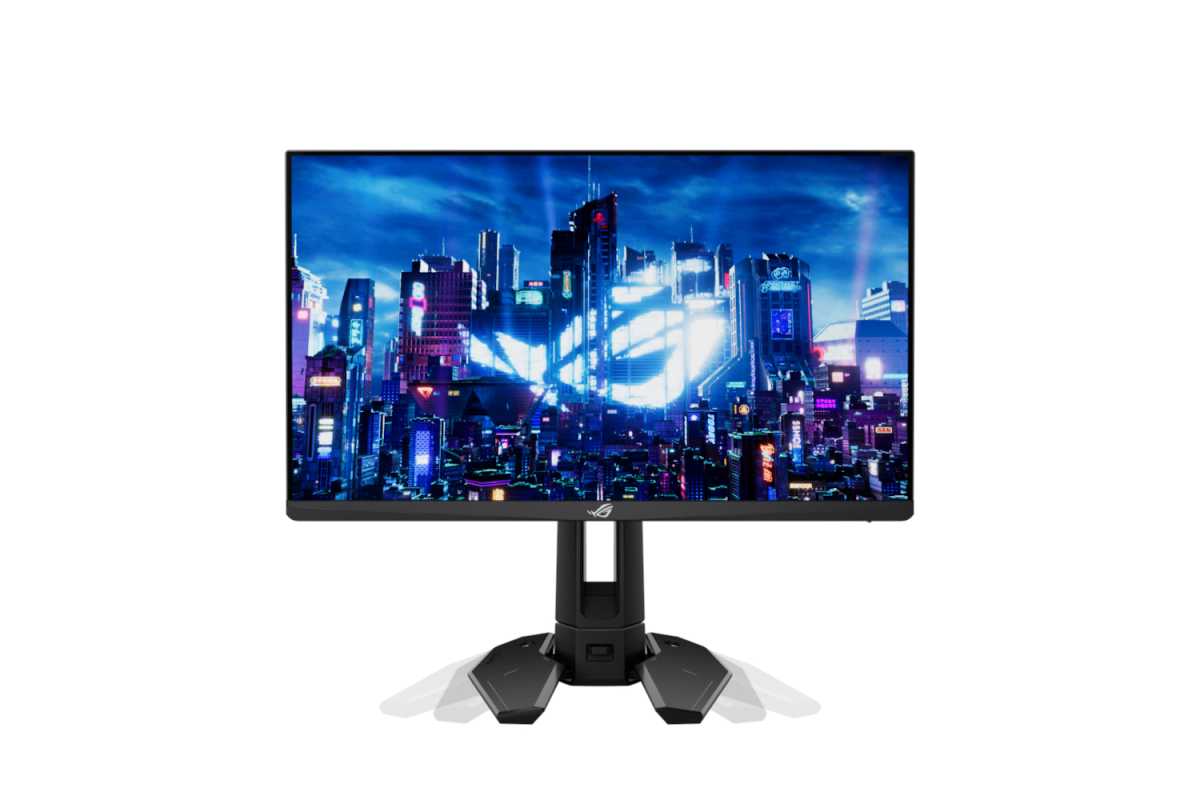
Asus
While most premium monitors are just now upgrading to 240Hz, Asus’ esports-oriented ROG Swift Pro PG248QP’s 24-inch 1080p IPS screen can hit a blistering 540Hz. This incredible speed puts a new frame on-screen everyone 1.85 milliseconds. Provided you’re playing a game capable of hitting 540 frames per second, of course. The monitor also supports Nvidia G-Sync and Nvidia Reflex Analyzer to ensure smooth frame pacing and the lowest possible latency.
Further reading: How Nvidia Reflex can make you a better esports gamer
The ROG Swift Pro PG248QP also surprises with an adjustable stand that has two retractable “claws.” They can be retracted to take up less space on your desk. Asus’ says this feature targets esports players who like to play as close to the monitor as possible, but it could be useful for anyone with a small desk.
Competitive PC gamers can expect to see this monitor arrive in Q2 2023. Asus hasn’t announced pricing.
LG OLED Flex
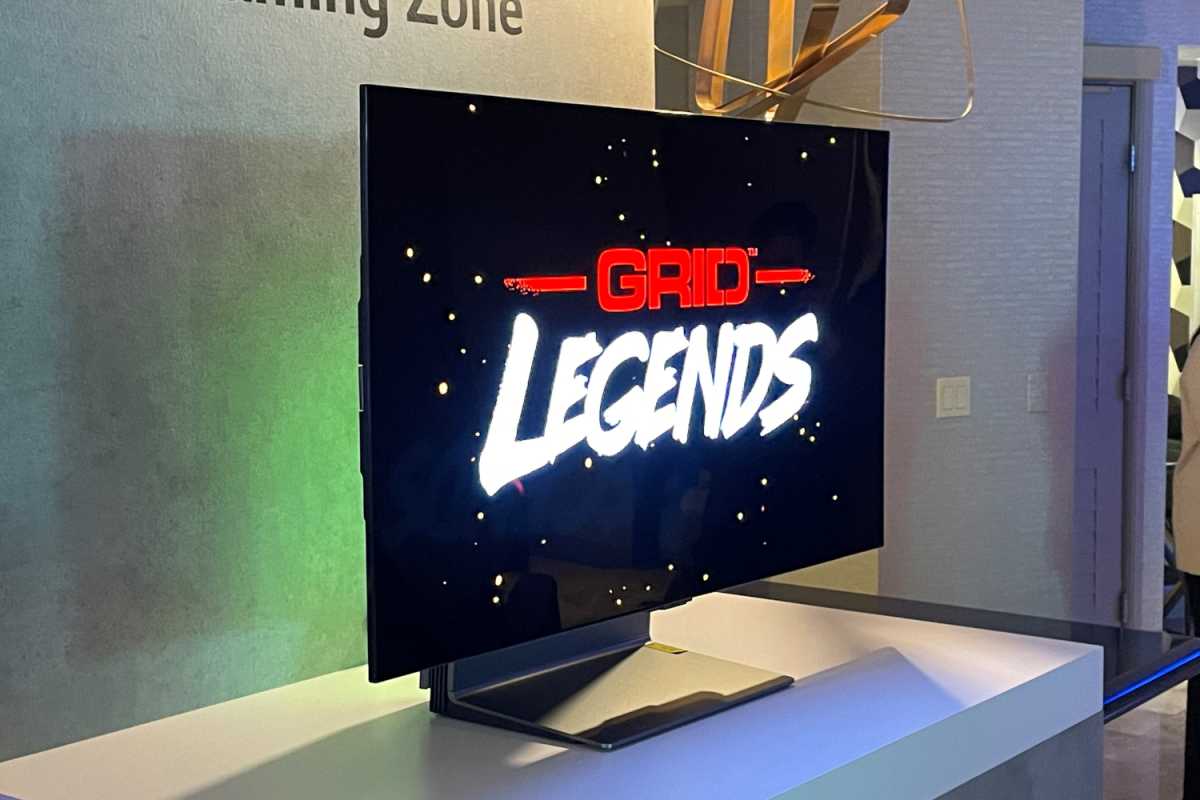
Matt Smith/IDG
Corsair’s 45-inch flexible Xeneon Flex offers the best of flat and curved-screen displays, but it has a downside: you have to flex it yourself. Manually. Like, with your muscles. LG’s OLED Flex takes a different approach, using a built-in motor to do the flexing for you. The monitor can shift from curved to flat, or some position in-between, with a touch of the bundled remote.
The LG OLED Flex isn’t an ultrawide monitor, which makes it less immersive than those stretched-screen alternatives, but it does offer 4K resolution and a refresh rate of 120Hz. It also has several special restricted display space modes that emulate a 32- or 27-inch screen, adding versatility for situations where the large display size isn’t desired. Personally, I find first-person shooters a bit stomach-churning on big screens, so I’d probably use these modes for Halo and Overwatch.
Pricing and availability for the United States hasn’t been revealed.
Lenovo ThinkVision P27-pz30 and P32-pz30
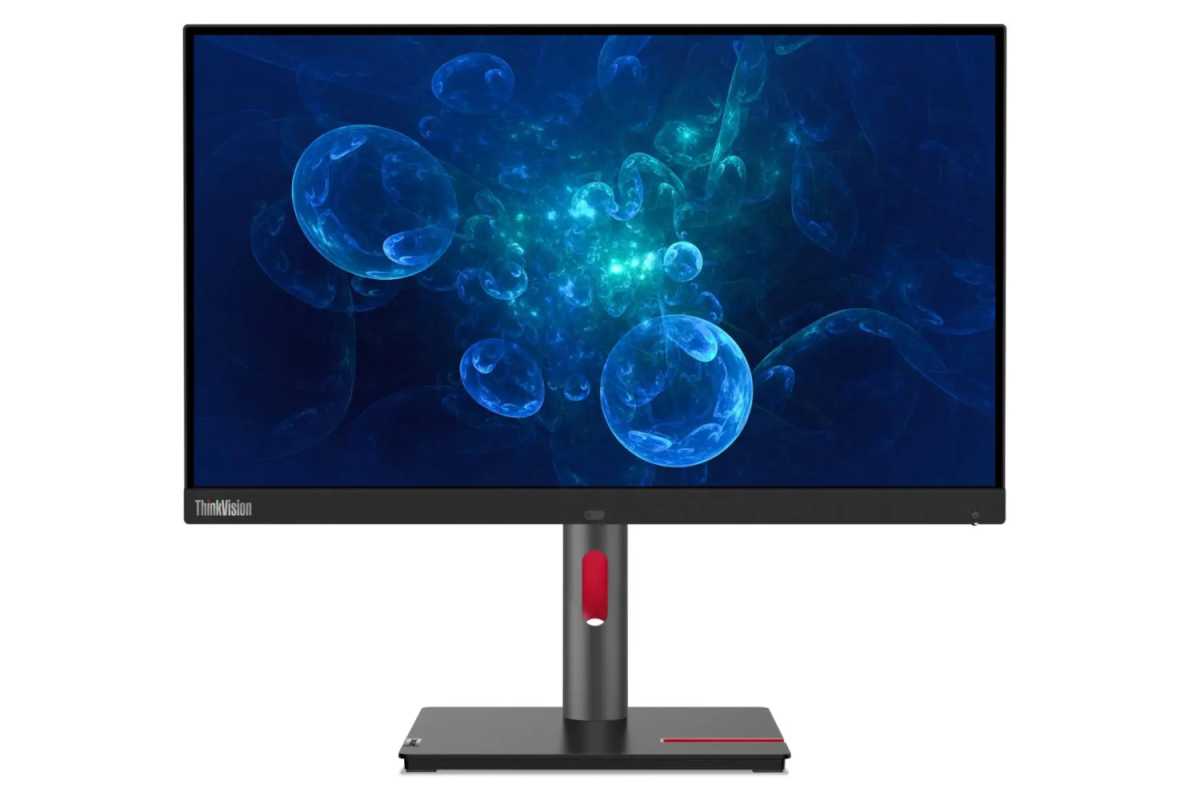
Lenovo
Lenovo’s business-like ThinkVision monitors are often unexciting, but the ThinkVision P27-pz30 and P32-pz30 are an obvious exceptions. These 4K IPS monitors pack a Mini-LED backlight with 1,152 dimming zones. This is top-shelf for modern Mini-LED monitors (aside from Samsung’s Odyssey line), providing excellent contrast and extreme bright highlights in HDR content. Both monitors are VESA DisplayHDR 1000 certified and claim a maximum peak brightness of 1,200 nits.
These monitors also support USB-C connections and provide up to 140 watts of power of USB-C power delivery, which is enough to handle most laptops that support USB-C charging and adds a bit of futureproofing (most current laptops don’t support USB-C charging over 100 watts, but it’s likely to become popular over the next few years).
Lenovo says the 32-inch model will be priced at $1,599 (the 27-inch model’s MSRP hasn’t been announced). That’s a big price drop over prior Mini-LED monitors with 1,152 dimming zones. The only catch? It won’t be available until August.
Samsung Odyssey OLED G9 49-inch
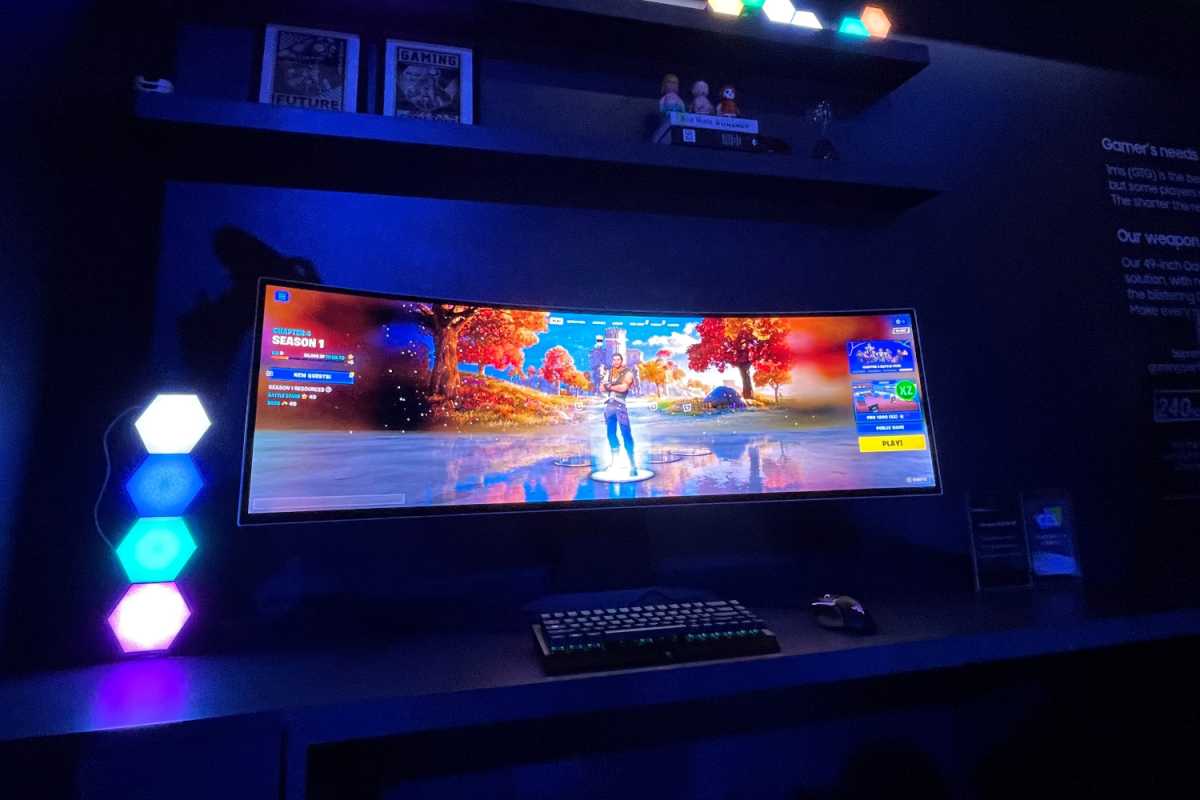
Matt Smith/IDG
Samsung’s flagship 49-inch super-ultrawide returns to CES 2023 with a big new upgrade: a QD-OLED panel. The new Odyssey OLED G9 promises all of the perks of other OLED monitors including a nearly infinite contrast ratio, a refresh rate up to 240Hz, low pixel response times, and a broad color gamut. The prior Odyssey Neo G9, which had a Mini-LED backlight, was already a stunner, so it’ll be interesting to see how the new OLED model compares.
The Odyssey OLED G9 also adds Samsung’s Smart Hub features including support for streaming apps, such as Amazon Prime, Netflix, and Hulu, plus Samsung Gaming Hub, which supports Xbox Cloud Gaming and Nvidia GeForce Now. Conveniently, Nvidia will soon add support for ultrawide screens to GeForce Now: not enough to make the most of the Odyssey OLED G9’s super-ultrawide format, but a step in the right direction.
Pricing and availability remain under wraps, unfortunately.
Samsung Odyssey Neo G9 (G95NC)

Matt Smith/IDG
Does a 49-inch super-ultrawide still feel a bit small? Well, Samsung has just the thing for you: the new Odyssey Neo G9, a 57-inch monster that measures four and a half feet in width. It’s big, it’s curved, and it’s the last word in monitor immersion.
Size aside, 2023’s Odyssey Neo G9 also impresses with its “dual 4K” resolution of 7,620 x 2,160. It has a Mini-LED backlight and is VESA DisplayHDR 1000 certified, meaning it can hit a maximum brightness of up to 1,000 nits. Despite its resolution, the monitor will still provide a maximum refresh rate of 240Hz. The monitor’s extreme resolution and refresh rate requires a ton of video bandwidth, so it includes support for the latest DisplayPort 2.1 standard.
Once again, pricing and availability remains to be seen—but it’s sure to be very, very expensive.
Acer Predator X45
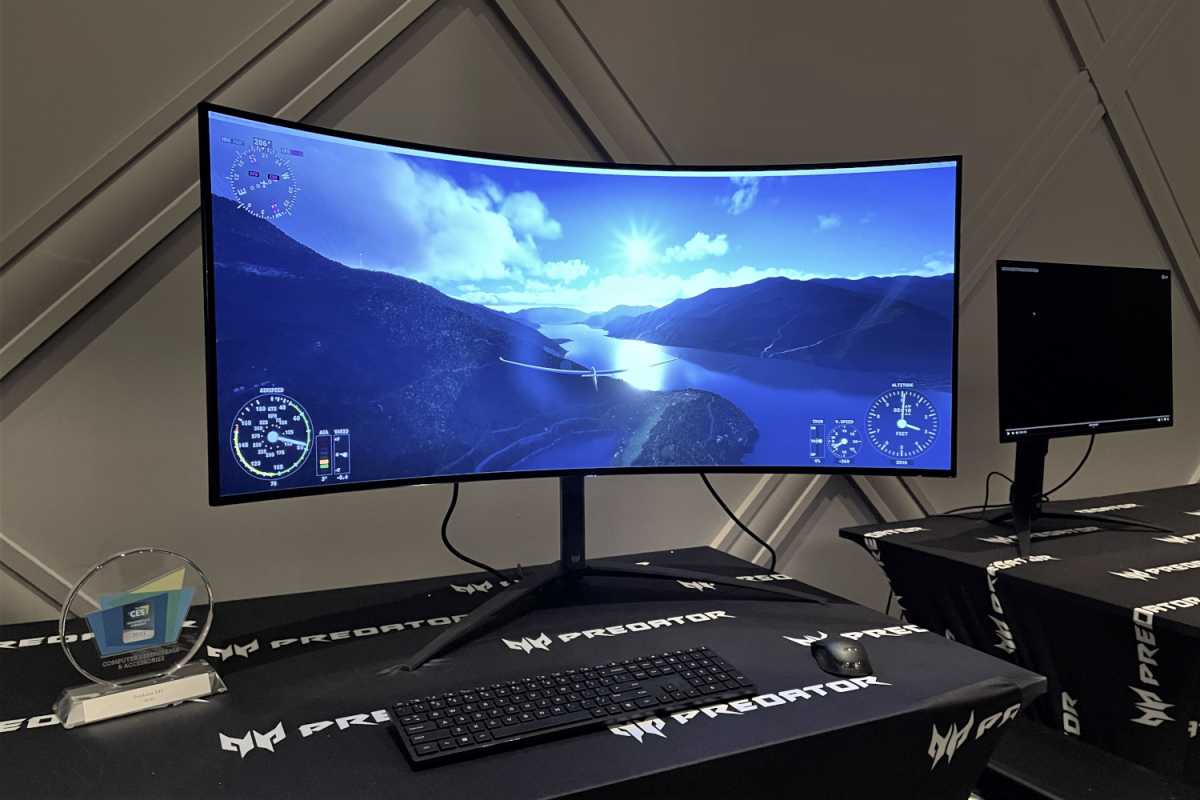
Matt Smith/IDG
The Acer Predator X45 is the company’s take on LG’s new 45-inch OLED panel, which is also found in the Corsair Xeneon Flex and LG Ultragear 45GR95QE-B. Indeed, the Predator and Ultragear monitors are extremely similar. Aside from sharing the same LG OLED Panel, with 3,440 x 1,440 resolution and 240Hz maximum refresh, they also have an identical (and aggressive) 800R curvature. These are big, beautiful displays only a few inches smaller than Samsung’s Odyssey OLED G9.
For me, though, the Predator X45 has one little extra that sets it apart. USB-C. The Predator X45, like the Predator X27U, has a USB-C port with DisplayPort Alternate Mode and up to 90 watts of USB Power Delivery. This offers added versatility and the chance for a one-port connection with modern laptops.
The Acer Predator X45 will arrive in Q2 of 2023 at $1,699.
MSI MEG 342
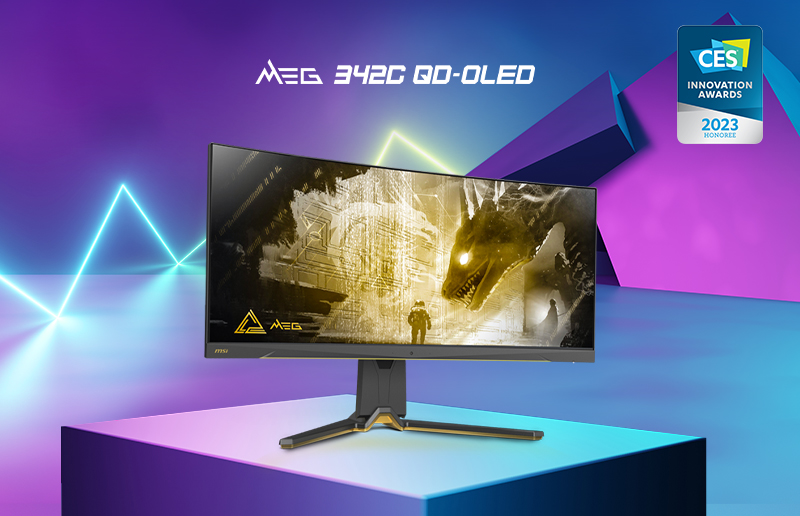
MSI
The MSI MEG 342 is an alternative take on the popular Alienware AW3423DW ultrawide that dominates PC World’s list of the best gaming monitors. It’s a 34-inch ultrawide with a QD-OLED panel, 3,440 x 1,440 resolution, and a refresh rate of up to 175Hz. While I haven’t had a chance to view this one first-hand, I expect MSI’s version will deliver image quality to rival Alienware’s top-notch ultrawide.
Of course, you might be wondering: Why buy the MSI instead? In truth, they are very similar, and the winner may often come down to whichever ends up on sale at the lowest price. Still, MSI does throw in an RGB light sync feature called Glow Sync. The Alienware also include RGB lighting, but it’s more subdued.
The MSI MEG 342’s pricing and availability remain unannounced.
Stay connected with us on social media platform for instant update click here to join our Twitter, & Facebook
We are now on Telegram. Click here to join our channel (@TechiUpdate) and stay updated with the latest Technology headlines.
For all the latest Technology News Click Here
For the latest news and updates, follow us on Google News.
